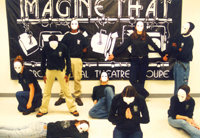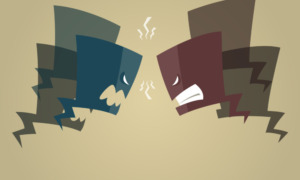
Spartanburg, S.C.
(864) 582-7588, ext. 335
www.orgsites.com/sc/imaginethat
Objective: Use the theater and young actors to educate youth about social issues.
In a Nutshell: Youths perform improvisational theater acts addressing such issues as substance abuse, violence, teen pregnancy and suicide. Participants receive acting lessons as well as education on the issues from Imagine That staff.
When and Where: All participants are from Spartanburg County, S.C., but they perform throughout South Carolina, and make trips each year to schools and communities around the country.
Who Started/Runs It: The troupe was created by a group of high school students in Spartanburg in 1994 with the help of Phillip Hudson, currently the program director for the Spartanburg Alcohol and Drug Abuse Commission (SADAC). Hudson oversees the troupe, while a full-time staffer, Kellie Brewer, implements most of the team-building activities and the drug and alcohol educational sessions.
Obstacles: “Obtaining respect among the artistic community and substance abuse field,” Brewer says. As the troupe performed, she says, it steadily built a good reputation among youth and adults.
Cost: The budget ranges from $60,000 to $70,000, mostly for staff. The program costs vary each year, depending on where the group travels.
Who Pays: The South Carolina Department of Alcohol and Other Drug Abuse Services provides an annual award of $60,000 to $70,000. A 2002 block grant of $23,000 from the Spartanburg Community and Economic Development Department was used to purchase a van. SADAC provides office space and equipment.
Youth Served: The participants are ages 14 to 18. All pledge not to use alcohol, tobacco or drugs while in the troupe. The troupe performs for any audience, ages 12 and up.
Youth Turn-On: “Many teens want to participate to act on stage,” Brewer says. She says Imagine That also seems to draw kids who “need an escape from their lifestyle, new friendships, or are simply looking for acceptance and a group to belong to.”
Youth Turn-Off: For many, the time commitment is too much. (The work takes a lot of time, and participants are expected to stay for at least a year.) Others have trouble dealing with youth participants who are gay or who identify with different religions. Those teens “either drop out in the beginning or learn tolerance if they choose to stay,” Brewer says.
Research Shows: For five years, Imagine That has administered evaluations to youth before and after their participation in the troupe. In each of the past four years, the number of participants who said they see regular smoking and drinking as a “great risk” increased by more than 13 percent from the start of the year to the end. During the 2003-2004 season, self-reported drug use by participants decreased by 9 percent.
What Still Gets in the Way: “Some participants find it difficult to be completely alcohol- and drug-free,” Brewer says. She says youth are never kicked out based on an isolated offense, and most offenders stop because other cast members press them to.































